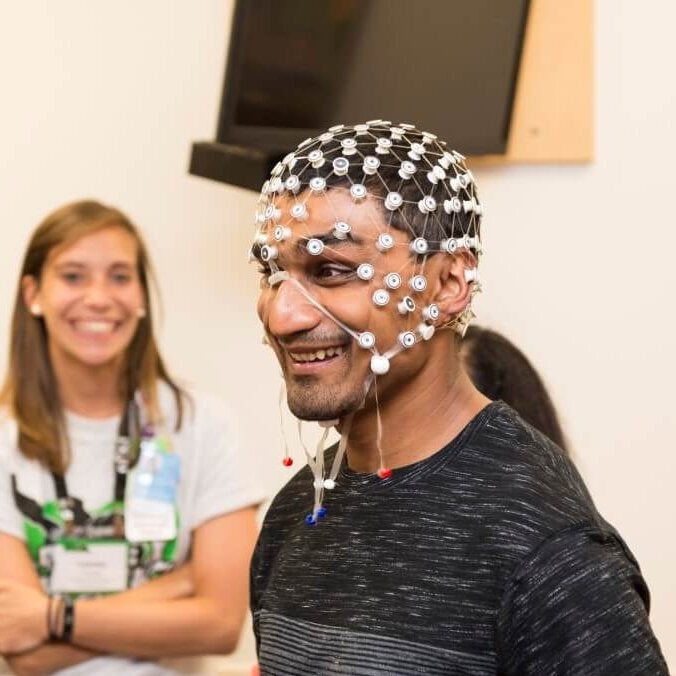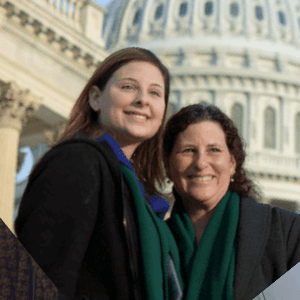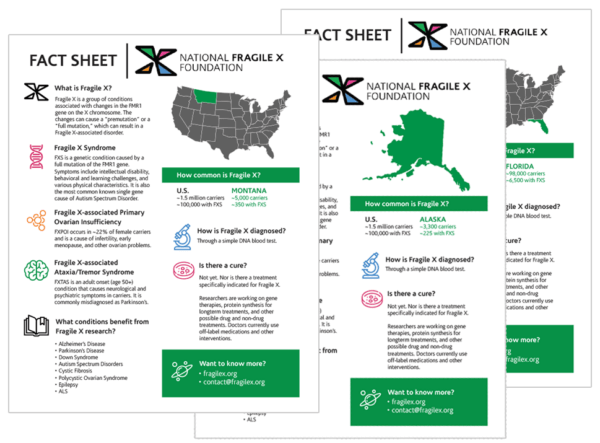Fragile X Advocacy
We actively advocate in Congress for Fragile X research funding, and policies that facilitate treatment development and create opportunities for individuals with intellectual and developmental disabilities.
Fragile X Advocacy
We actively advocate in Congress for Fragile X research funding, and policies that facilitate drug and treatment development and create opportunities for individuals with intellectual and developmental disabilities.
Advocacy is key to support the mission of the NFXF — to serve the entire Fragile X community to live their best lives by providing the knowledge, resources, and tools until, and even after, more effective treatments and a cure are achieved.
Essential to advocacy success is the participation of parents, siblings, self-advocates, friends, medical providers, and researchers from the Fragile X community. Members of Congress listen to voices from home. They are the loudest, most effective voices and it is critical that you attend meetings with members of Congress and their staff. You don’t have to be eloquent or perfect — you just have to be honest, respectful, and solution-oriented. Your participation moves the needle for more research funding and policies that help families impacted by Fragile X have a better life.
New to advocacy? Need a refresher on the terminology? Our partner, the Everylife Foundation, has a comprehensive glossary of policy and advocacy terms you can use.

Advocacy Day
NFXF Advocacy Day 2025
We will announce in-person training dates as we get closer to the 2025 dates.
Constituents (aka YOU) connecting with your members of Congress and their staff are THE KEY to our successful advocacy program. You make it possible.
The pillar of our Advocacy work is Advocacy Day. Every spring, for over 20 years, we gather in Washington, D.C., in a concerted, joint effort to raise awareness of Fragile X in Congress and to ask for research funding and policies that provide the opportunity for a better life for those living with Fragile X.
It is easy to think your voice doesn’t matter — it does. Voices from home are the loudest! They know you are a voter. Showing up, telling your story, educating them, and showing them practical ways they can help is what makes a difference!
What does participation look like?
We take care of all of the details! You can expect:
- Training: We will have a combination of mandatory online self-paced training ahead of time and group training/preparation in person at the hotel on the afternoon of Monday, February 26. We will also be hosting a virtual Zoom meeting earlier in the month of February for new or returning advocates.
- Materials: You receive all of the materials you’ll need.
- Meetings: Your meetings are scheduled for you and everything is coordinated with other advocates from your area. Plan to be in-person for your meetings.
The bottom line? Don’t be nervous — we will help you each step of the way.
Advocacy Day 2025
February 24-25
Agenda
We will announce the agenda and other details as we get closer to the dates.
Scholarships
Learn More
Families, caregivers, self-advocates, doctors, researchers — you are what moves the needle on Capitol Hill.
Read the Fragile X Advocacy Newsletter
Questions? Please email the NFXF Team at advocacy@fragilex.org.
What We’ve Accomplished

Research
We advocate for investments by the Federal government in Fragile X research and policies that spur drug and treatment development for rare disorders.
Ensuring successful Fragile X research is a multi-faceted approach that includes participation from researchers and families, federal policies, and private, institutional, and federal investments. The investment by the federal government over the past two decades has exceeded $500 million - much of which is attributed to the work of NFXF Advocates. Specifically:
- Over $500 million in Fragile X research between the National Institutes of Health (NIH), the Centers for Disease Control and Prevention (CDC), and the Department of Defense (DOD).
- CDC: $2M/year, which funds the FORWARD research program
- NIH: $68M in active awards specific to FMR1-related conditions and disorders
- Over $20M in grants through the Department of Defense (DOD) program since 2010
- A comprehensive National Institutes of Health (NIH) Blueprint to guide research targeting all Fragile X-associated disorders.
- The Orphan Drug Act to encourage private companies to repurpose drugs approved for other disorders for rare diseases/disorders.
We have also supported:
- Friends of NICHD Letter: Requesting continued support of NIH and NICHD funding.
- The Defense Health Research Consortium: Requesting continued funding of the Congressionally Directed Medical Research Program at the Department of Defense.

Better Lives
Everyone with an intellectual and developmental disability has the same right to the pursuit of life, liberty, and happiness. We work for policies to make that possible.
We like to say if you have met someone with Fragile X, you have met someone with Fragile X. Each individual is unique, with unique needs. Our goal is to promote policies that make better lives possible and give each family an opportunity to choose the path that they feel is best for them. We recognize the importance of social support programs, such as SSDI, Medicaid, and Medicare, the importance of giving families opportunities to save additional resources, and how essential it is for individuals to find work meaningful to them. Our successes include:
- ABLE Accounts, which are tax-deferred savings accounts for adults living with disabilities, similar to 529 college savings accounts.
- The ACE Kids Act to help children on Medicaid with “complex medical conditions,” receive better, coordinated care, including across state lines.
- The RAISE Act to improve federal, state, and local policies for caregivers of adults.
We have also supported:
- Continued, increased access to telehealth beyond the pandemic.
- The HEADS Up Act to make more specialists available under Medicaid and community-based health centers specific to IDD by designating intellectual and developmental as a medically underserved population.
- Charlotte Woodward Organ Transplant Discrimination Prevention Act. Prohibiting discrimination on the basis of mental or physical disability in cases of organ transplants.

Awareness in Congress
Before a member of Congress can help, they have to know about Fragile X. That is a key component of our advocacy — raising awareness of Fragile X among the policymakers.
NFXF Advocates have been very successful at educating Congress! Visiting offices, sharing personal stories, introducing Congress to self-advocates, and more demonstrates to Fragile X is real, it affects their constituents, and there are ways they can help. This work and our asks are continuous, including :
- The House Fragile X Caucus. Members of the House can join the Caucus to demonstrate their support of families living with Fragile X. The co-chairs work each year to raise awareness and to support the annual appropriations request for research. The Caucus is co-chaired by one Democrat and one Republican, currently Rep. Joe Courtney (D-CT-2) and Rep. Chris Smith (R-NJ-4).
- When Gregg Harper served in Congress, he established an internship program in the House for individuals with IDD. The mission was two-fold: give these individuals a chance to serve and raise awareness of IDD among the staff and members. It continues to this day, and at least two individuals with Fragile X have participated, and upon his retirement, was renamed the Gregg and Livingston Harper Internship Program for Individuals with Intellectual Disabilities. Livingston is Gregg's son and has Fragile X syndrome.
Legislation We’re Currently Supporting
BENEFIT Act of 2023
Requires the Food and Drug Administration (FDA) to consider relevant patient experience data in the risk-benefit assessment framework used in the process of approving new drugs.
Transformation to Competitive Integrated Employment Act
Addresses employment standards for people with disabilities.
Charlotte Woodward Organ Transplant Discrimination Prevention Act
Prevents the use of a disability to determine a patient’s eligibility for an organ transplant.
Cameron's Law
Increases the rate of the tax credit for clinical testing expenses for rare diseases or conditions from 25% to 50% (orphan drug tax credit)
Disability Employment Incentive Act
Expands tax credits and deductions that are available for employers who hire and retain employees with disabilities.
KEEP Telehealth Options Act 2023
The Centers for Medicare & Medicaid Services to report on telehealth expansion during the COVID-19 public health emergency and through December 31, 2024.
How Can You Help?

Download Your State’s Fact Sheet
For use on Advocacy Day (or any day), we created these one-pagers to help introduce someone to Fragile X, including the number of affected individuals — constituents — currently residing in each state.
If you’re nervous, you’re not alone. We’re here to help you each step of the way —
so sign up and make a difference!
Watch
Gregg Harper represented Mississippi's 3rd Congressional District in Congress from 2009-2019. He is also a Fragile X dad to Livingston. Now, he works as an NFXF Team member on our advocacy program. He spoke at the 17th NFXF International Fragile X Conference on the importance of advocacy and how to do it well. You can now watch his full keynote.
Learn More
Ground-breaking Genetic Research Gives Hope for Potential Treatment of Autism’s Core Symptoms
As scientists uncover the precise links between autism and the Fragile X gene, potential treatments to reverse many of the core symptoms of both autism and Fragile X syndrome (FXS) are moving closer to reality.
Congressman Harper Re-Introduces the TEAM Act
The three bills which comprised the TEAM Act began and finished the 112th Congress without ever making it to a vote. The package of bills serve the dual function of promoting the training and employment [...]
Collaboration to Promote Self-Determination Criticizes ESEA Waivers
The following is about a topic important to all parents of children with FXS, including those who are now adults or soon to become adults. The NFXF continues to provide leadership on issues related to [...]
Your Vote Matters in the Fragile X World
Jeffrey Cohen Director of Government Affairs & Advocacy In case you hadn’t noticed there’s a big election coming up. The upcoming presidential election is sure to have an impact on our country, your locale [...]





